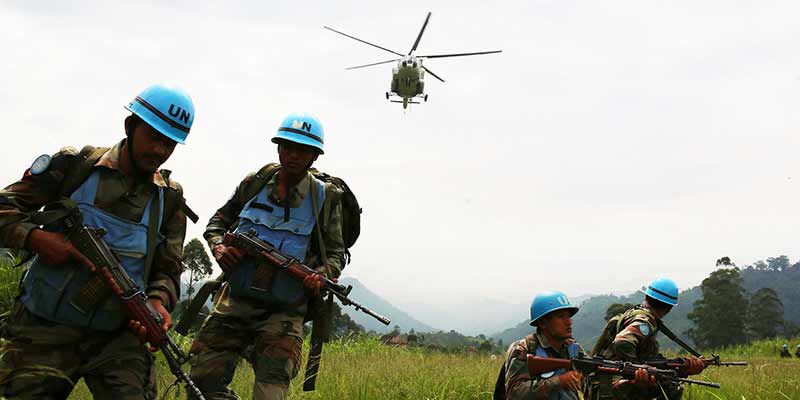- World
- Jul 27
Explainer / UN peacekeeping
Two Border Security Force personnel, who were part of the UN peacekeeping mission in the Democratic Republic of Congo, were killed on July 26 during violent protests in the Central African country.
The two soldiers were part of MONUSCO — the United Nations Organisation Stabilization Mission in Democratic Republic Congo.
At least five people were killed and about 50 others injured on the second day of demonstrations in Congo’s eastern city of Goma against the United Nations mission in the country.
What is UN peacekeeping?
• UN peacekeeping helps countries torn by conflict create conditions for lasting peace. Peacekeeping has proven to be one of the most effective tools available to the UN to assist host countries navigate the difficult path from conflict to peace.
• It is a unique global partnership. It brings together the General Assembly, the Security Council, the Secretariat, troop and police contributors and the host governments in a combined effort to maintain international peace and security.
• The first UN peacekeeping mission was established in May 1948, when the UN Security Council authorised the deployment of a small number of UN military observers to the Middle East to form the United Nations Truce Supervision Organisation (UNTSO) to monitor the Armistice Agreement between Israel and its Arab neighbours.
• In over 70 years, more than one million men and women have served under the UN flag in more than 70 UN peacekeeping operations. More than one lakh military, police and civilian personnel from 125 countries currently serve in 13 peacekeeping operations.
• In the early years, UN Peacekeeping’s goals were primarily limited to maintaining ceasefires and stabilizing situations on the ground so that efforts could be made at the political level to resolve the conflict by peaceful means. Those missions consisted of military observers and lightly armed troops with monitoring, reporting and confidence-building roles in support of ceasefires and limited peace agreements. Troops and police came from a relatively small number of countries and they were mostly men.
• Over the years, UN Peacekeeping has adapted to meet the demands of different conflicts and a changing political landscape. Today’s multidimensional peacekeeping operations are called upon not only to maintain peace and security but also to facilitate the political processes, protect civilians, disarm combatants, support elections, protect and promote human rights and restore the rule of law.
• Peacekeeping has unique strengths, including legitimacy, burden sharing, and an ability to deploy and sustain troops and police from around the globe, integrating them with civilian peacekeepers to advance multi-dimensional mandates.
The role of UN Security Council
• The Security Council has primary responsibility, under the United Nations Charter, for the maintenance of international peace and security. It is for the Security Council to determine when and where a UN peace operation should be deployed.
• The Security Council responds to crises around the world on a case-by-case basis and it has a range of options at its disposal. It takes many different factors into account when considering the establishment of new peace operation.
• The Security Council establishes a peace operation by adopting a Security Council resolution. The resolution sets out that mission’s mandate and size.
• The Security Council can vote to extend, amend or end mission mandates as it deems appropriate.
The role of General Assembly in financing operations
• While not normally directly involved in political decisions on establishing or terminating UN peace operations, the General Assembly does play a key role in peace operation financing.
• As all UN Member States share the costs of peacekeeping, the Assembly apportions these expenses based on a special scale of assessments, taking into account the relative economic wealth of Member States, with the permanent members of the Security Council required to pay a larger share because of their special responsibility for the maintenance of international peace and security.
• The General Assembly, through its Fifth Committee (Administrative and Budgetary) approves and oversees the peacekeeping budget. This includes how specific field operations are funded and equipped, based on detailed submissions provided to it by the UN Secretary-General.
What are the duties of peacekeepers?
• UN peacekeepers (often referred to as Blue Berets or Blue Helmets) provide security and the political and peacebuilding support to help countries make the difficult, early transition from conflict to peace.
• While most peacekeepers are serving in the military or police, 14 per cent are civilians who perform a wide range of functions, from serving as the civilian leadership of the mission to working in the areas of political and civil affairs, human rights, elections, strategic communications, IT, logistics, transport and administration and more.
• Women peacekeepers today play an increasingly prominent role and are crucial towards improving the performance of the missions. They serve as police officers, troops, pilots, military observers, and other uniformed and civilian posts, including in command positions.
• With its expanded role and operations in some of the world’s most challenging environments, peacekeepers face considerable risks. Since 1948, more than 3,500 personnel have lost their lives serving in UN peace operations.
International Day of UN Peacekeepers
• Every year, May 29 is observed as the International Day of United Nations Peacekeepers. The day was established to honour the memory of the UN peacekeepers who have lost their lives in the cause of peace, and to pay tribute to all the men and women who have served and continue to serve in UN peacekeeping operations for their high level of professionalism, dedication and courage.
Manorama Yearbook app is now available on Google Play Store and iOS App Store



